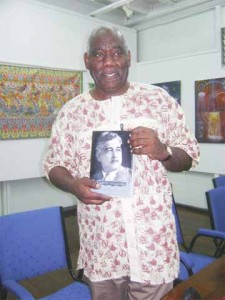Albert Raymond Forbes Webber, a long forgotten politician, journalist, poet and novelist, was resurrected for a new generation of Guyanese at Castellani House, last Thursday evening.

“Cast away, forgotten even by his own Guyanese people,” was how Dr Selwyn Cudjoe described the Tobago-born Webber, who championed the cause of the people of British Guiana while he lived here. Dr Cudjoe, who is a Professor of Africana Studies at Wellesley College in the United States, reintroduced Webber in his book, Caribbean Visionary: A.R.F. Webber and the Making of the Guyanese Nation, a project he said was years in the making. The book was unveiled here on Thursday, after previously being launched in several other countries. Dr Cudjoe said the Guyana launch was the highlight of his tour.
Using Webber as a lens, the book outlines the struggle for justice and equality in an age of imperialism in the early decades of the twentieth century. Caribbean Visionary… examines Webber’s novel, Those That Be in Bondage, his travel writing and his poetry, and also chronicles his formation of the West Indian Press Association, his commitment to the Caribbean, his advanced economic ideas, his campaign in relation to British Guiana’s constitution, and his championing of its people’s causes. The work was described as an important addition to Caribbean intellectual history and an indispensable resource for scholars interested in the region’s literature, political science and economic thought. It was also referred to as invaluable for those wishing to understand the genesis of contemporary Guyana and the English-speaking Caribbean. Webber died in 1932.
In his presentation, Dr Cudjoe detailed his efforts researching for the book, which led him to the United Kingdom, Canada, Guyana and parts of the United States, where he is based. He started work on it in 1987, forgot about it for 15 years, and completed it after re-discovering the manuscript.
He noted that Webber had achieved many firsts here and in the Caribbean pointing out that VS Naipaul was not the first West Indian to write a book about East Indians in the Caribbean, as Webber did this in 1917 with the publication of Those That Be in Bondage.
Webber was born in Tobago in 1880 and came to Guyana in 1899, went to Bartica and got married two years later. In 1919 he became the editor first of the Daily Chronicle and then the New Daily Chronicle, and thereafter ran for and won a seat in the Legislative Council of British Guiana in 1921. According to the professor, Webber took on the colonial administration and fought them “tooth and nail” as he struggled for the rights of Guianese.
Dr Cudjoe said that Webber crossed the Atlantic several times as he campaigned for self government for British Guiana, and though forgotten, he remained an important person. He asserted that in terms of the foundation for their ideas, the late Presidents Forbes Burnham and Cheddi Jagan picked up many of these from Webber. Dr Cudjoe declared that Guyanese do themselves a disservice in terms of the analysis of contemporary Guyanese history when they speak as though this began with Burnham and Jagan. Long before those two, he said, there were other very courageous people who fought for the rights of locals. Webber was “a great man who did a lot for our society,” he declared.
In addition to Dr Cudjoe’s presentation, there were two reviews by retired Justice Donald Trotman and attorney Hubert Rodney. The current crop of politicians came in for some chiding from Trotman, who described them as “arrogant and selfish.” He personally was not present, however, and his review was read by Curator of Castellani House, Elfrieda Bissember.
Rodney said that the book was important because it laid the groundwork for where we were and the direction in which we needed to go. He said that it taught the fundamental point that politicians must read history, because they often had the impression that they were making history. He urged Guyanese to read the book, noting that it spoke of people who were “lost” in many respects, and the book must be read to understand the period they were in. He said that upon Webber’s arrival here, he was thrown into a world where there was a tremendous amount of turmoil and he took the government on and came into conflict.
Webber demonstrated an ability to outwit the culture that he was challenging, and he internationalised his struggle, he said. The attorney pointed out, however, that mystifyingly, Webber didn’t become a cynical man because of what was happening to him. Guyanese had the impression that the independence struggle was the only struggle, he said, but there were others that had come before.
A reading of a portion of the book was done by Jamal La Rose, while Bissember chaired the proceedings. The great-granddaughter of Webber, Karen Whitehead, was presented with a copy of the book as was the National Library and other institutions.
Dr Cudjoe told Stabroek News that he was making a documentary on Webber and asked that anyone who knew or remembered him to make contact at scudjoe@wellesley.edu. Filming is expected to begin in a few months.





